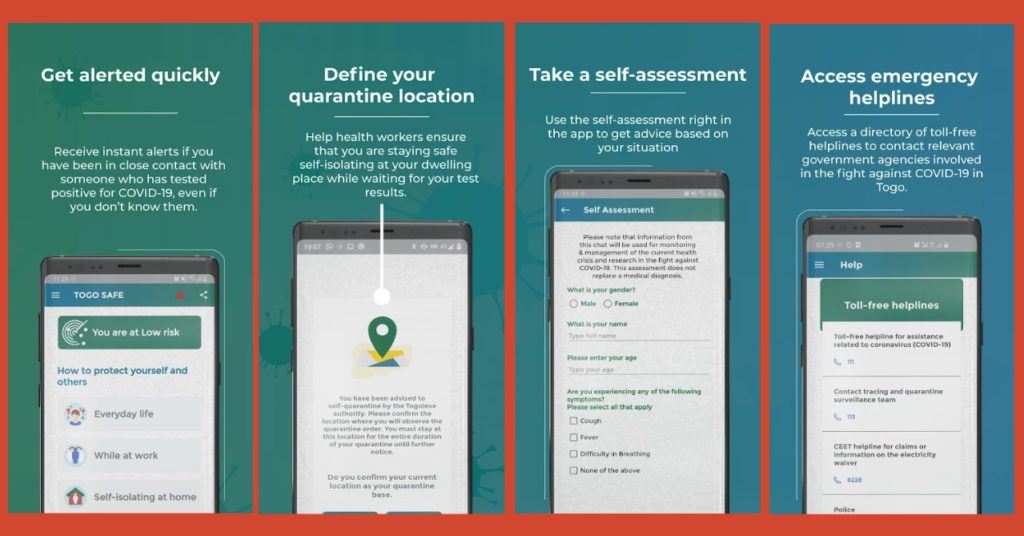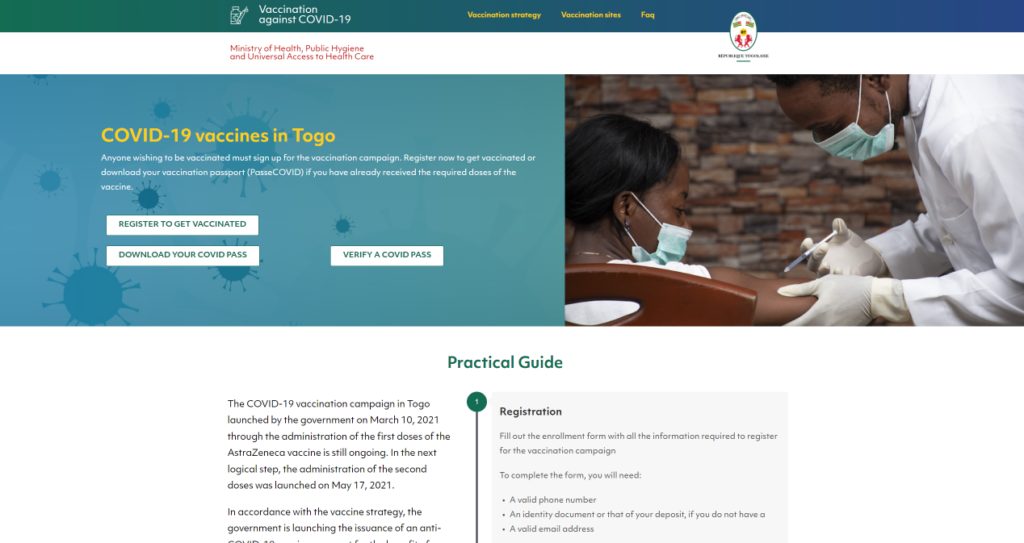Globally, the COVID-19 disease has infected more than 290 million people, claimed well over 5 million lives, and plunged millions into extreme poverty. The pandemic has been devastating in every sense of the word, and its impact felt in Africa, too, where over 9.7 million cases and 228,000 deaths have been recorded.
But, within the continent, the magnitude of the crisis has been uneven by country. One of the lesser affected countries is Togo. The French-speaking country has, so far, recorded 31,500 infections and 250 deaths from COVID, per data from the Africa Centres for Disease Control and Prevention (Africa CDC)—relatively lenient nominal figures compared to Nigeria’s or South Africa’s.
In the small West African country of about 8 million people and a gross domestic product of around $7.5 billion, locally-led digital solutions have been crucial to authorities’ efforts to curb the pandemic’s reach.
Last month, Togo’s Ministry of Digital Economy and Transformation, led by Havard graduate and former World Bank analyst Cina Lawson, unveiled the latest in an expanding list of mobile-based solutions to help Togolese tide over the pandemic.
A new mobile application, PassCovid19TG, allows the population to easily upload, access, and present their COVID-19-related health information. Documents such as vaccination certificates, PCR tests, and the Togolese or European Union COVID Pass, whether in digital or paper format, can be uploaded on the app via scanning their QR codes.
By using smartphones to present COVID digital certificates, the new application is expected to facilitate and improve the control and checking of health passes in Togo, where people have to present passes before they’re allowed into public spaces, from airports and worship centres to restaurants and bars.
“The PassCovid19TG can also be used when travelling, to check in advance the validity of the Pass in the country of destination, particularly in the European Union area,” said Lawson, who’s overseen the creation of several technological solutions that have helped Togo effectively handle the COVID-19 crisis better than its wealthier, larger, and supposedly more tech-savvy regional neighbours, Nigeria and Ghana.
Like much of the rest of Africa, COVID lockdowns and restrictions threatened livelihoods in Togo, a country where pre-pandemic per capita GDP was less than $700 in 2019 and average income below $2 a day. Per World Bank estimates, about 62% of jobs in the country were affected by the crisis, particularly in the informal sector, which employs the majority of Togo’s labour force outside of the agricultural sector.
Faced with the threat of worsened poverty amid rising unemployment and dwindling income, the government in April 2020 launched a program called Novissi (meaning “solidarity” in the local Ewe language)—a mobile money-based cash transfer scheme to help those most economically affected by the pandemic.
More than 1.6 million Togolese registered for the monetary support through their mobile phones, according to data on the Novissi website. Led by Lawson, the digital ministry then used voter identification data to select beneficiaries by targeting some 600,000 people who listed themselves as “informal workers” in urban areas, an indication they were likely to be poor.
But with the government unable to support every one of the millions of informal workers, identifying the poorest citizens in the rural parts of the country required more sophisticated solutions. Togo turned to satellite imagery and artificial intelligence.

With the help of researchers at the University of California and the US-based NGO GiveDirectly, the government was able to identify the poorest 100 cantons in the country through satellite imagery data. It then analysed mobile phone data from primary network providers to identify users in those areas with patterns that suggested they were living under the poverty line.
“We chose a fully digital approach, which makes it possible to directly reach beneficiaries through mobile payments while guaranteeing traceability and transparency,” Lawson’s statement on the Novissi website reads. “The solution represents a real methodological break with the past and foreshadows the way in which social safety nets and cash transfer programs will henceforth be implemented in our country.”
Lomé has so far distributed around CFA13.3 billion (over $22 million) directly into the mobile wallets of more than 800,000 people in different communities suffering from the crisis, according to official data. Women make up the majority of beneficiaries—over 500,000—and received more ($22) in single 3–5 monthly cash transfers than men ($20).
“People should not have to choose between death by COVID-19 or by hunger,” President Faure Gnassingbe said on the Novissi programme. “Other African leaders could also use a similar mobile-based, cash transfer scheme.” Anit Mukherjee, a policy fellow at the Centre for Global Development, in this Bloomberg article claims Novissi makes even America’s COVID cash transfer programme look like a “dinosaur”.
Around three months after launching the Novissi scheme and as reported COVID cases surged in Togo with the emergence of the more contentious and deadly Delta variant, the government launched a COVID contact-tracing application, Togo Safe, to initiate, in real-time, the health protocol needed to contain the virus’s spread.
The web and mobile-based platform relies on digital geolocation to track infected individuals and immediately issues notifications to others whenever they come in contact with those who’d tested positive for the virus.
On the app, Togolese can also view the number of COVID cases in their area as well as get access to health advice and a directory of useful pandemic-related hotlines.

Togo’s tech-savvy approach to handling the pandemic extends to vaccination efforts. Within a week of receiving 156,000 doses of COVID-19 vaccines from the COVAX facility last March, the country was able to vaccinate 98% of its health workers with the help of a system that relied on digital channels to reach people across the country.
Authorities launched a mobile and web-based service that allows Togolese to register for vaccination using their phones. An individual just has to dial the shortcode *844# from a local number and complete necessary steps, after which they receive a 14-digit code to be shown at the health centre for vaccination.
In a month, more than 50,000 people had registered for vaccination through SMS and the website. Togo currently has the second-highest vaccination rate in West Africa, after Cape Verde.
The digital-driven response appears to be effective, keeping COVID infection rates in Togo at low levels so far while the poverty rate only rose marginally in 2020. It’s also attracted international attention and recognition. On the COVID Performance Index developed by the Australian think tank, Lowy Institute, the West African country was ranked the 2nd to best handle the crisis in Africa, and the 15th globally. Many African countries have shown interest in replicating Novissi, Lawson told Bloomberg.
Togo may not be known for tech startups with global appeal and recognition or billions in venture funding, but the country has ambitions to become a digital hub by 2025, riding on the penetration of mobile connections. As of January 2021, more than 80% of the population had a mobile phone.
Considering the manner in which the government has been able to leverage ICTs in its COVID response, Damien Mama, who was United Nations Resident Coordinator in Togo until September 2021, believes the small West African nation is on track to improving its economy with digital technologies.
“The digital sector is without a doubt one of the most promising means to achieve the sustainable development goals in a small country with big ambitions like Togo,” the UN official said in a post.
If you enjoyed reading this article, please share it in your WhatsApp groups and Telegram channels.




















